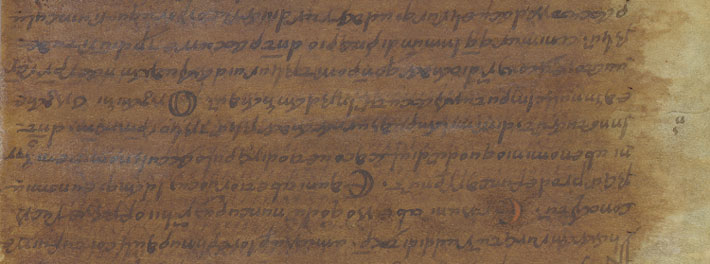 NEW YORK, NEW YORK—About half of an ancient text discovered in an abbey library in northern Italy in the early nineteenth century has been recovered with multispectral imaging and translated by Alexander Jones of New York University and his colleagues at the University of Paris, according to a Live Science report. Written in Greek on parchment, the text has been attributed to mathematician Claudius Ptolemy, who lived in the first century A.D. “Unfortunately, we don’t have the first and the last pages, so we don’t have an author name,” Jones said. “But things started to show up that are very characteristic of Ptolemy’s Greek vocabulary,” he explained. The work describes how to construct a meteoroscope, an instrument made up of nine metal rings that was used to make astronomical calculations. The pages were difficult to read because in the sixth or seventh century, the parchment was reused for another work in Latin by a Spanish theologian. Then, in 1819, the cleric who discovered the text attempted to read the ancient work by removing the Latin text with chemicals, turning portions of the pages dark brown. Read the original scholarly article about this research in Archive for History of Exact Sciences. To read about another ancient astronomical instrument, go to "Mapping the Past: The Nebra Sky Disc."
NEW YORK, NEW YORK—About half of an ancient text discovered in an abbey library in northern Italy in the early nineteenth century has been recovered with multispectral imaging and translated by Alexander Jones of New York University and his colleagues at the University of Paris, according to a Live Science report. Written in Greek on parchment, the text has been attributed to mathematician Claudius Ptolemy, who lived in the first century A.D. “Unfortunately, we don’t have the first and the last pages, so we don’t have an author name,” Jones said. “But things started to show up that are very characteristic of Ptolemy’s Greek vocabulary,” he explained. The work describes how to construct a meteoroscope, an instrument made up of nine metal rings that was used to make astronomical calculations. The pages were difficult to read because in the sixth or seventh century, the parchment was reused for another work in Latin by a Spanish theologian. Then, in 1819, the cleric who discovered the text attempted to read the ancient work by removing the Latin text with chemicals, turning portions of the pages dark brown. Read the original scholarly article about this research in Archive for History of Exact Sciences. To read about another ancient astronomical instrument, go to "Mapping the Past: The Nebra Sky Disc."
Multispectral Imaging Recovers Parts of an Ancient Scientific Text
